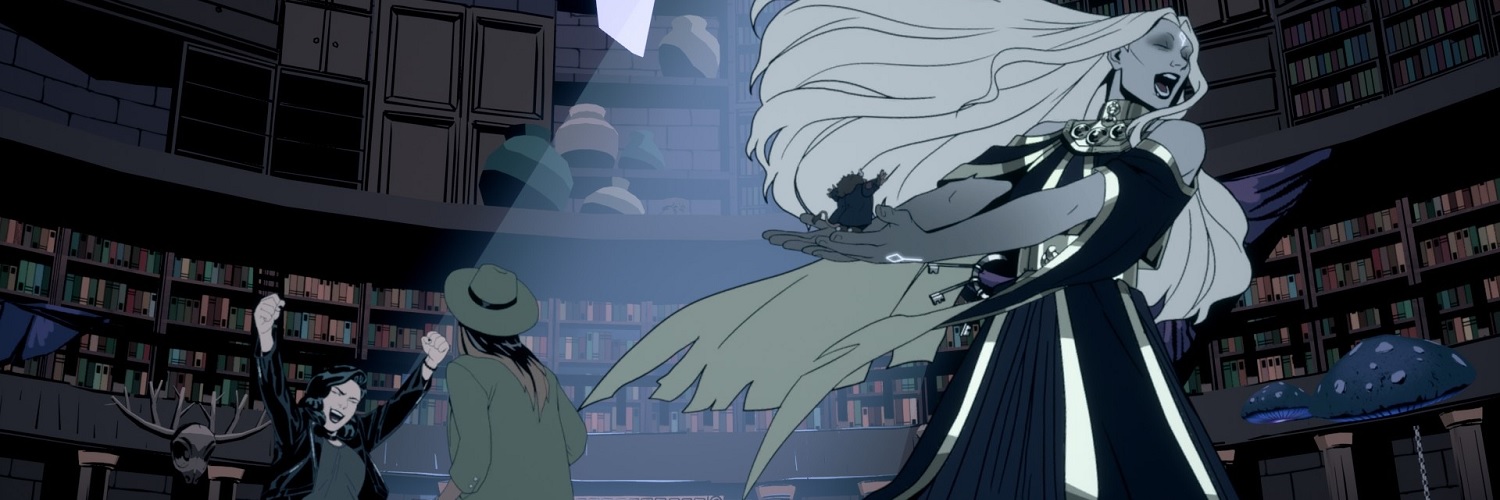
Stray Gods: The Roleplaying Musical PC Review
I have played various video game genres, some straightforward and some that blend genres together to form a new sub-genre, but I have not experienced anything like Stray Gods: The Roleplaying Musical. I cannot imagine what the developers were thinking when coming up with the design. I guess it would have been something like “What happens if we take some ideas from visual novel games and blend in a bit of the recent heavy story dialogue from Telltale Games with Disney’s Fantasia”. This is how I explained it to a recent friend who was asking me what the game was like.
The developers, Summerfall Studios, call it a roleplaying musical adventure game, and this is a new style of storytelling; one part musical, one part visual novel with some choice selections that alter some of the game’s outcomes. It is a combination that feels refreshing for the medium. I am not the biggest musical fan, and so I cater to more comedy or horror musicals than anything else, such as South Park: Bigger, Longer & Uncut, The Happiness of the Katakuris and Little Shop of Horrors. Stray Gods: The Roleplaying Musical takes the theme of murder and throws in Greek mythology, which is something I was totally into from the first song of the game.
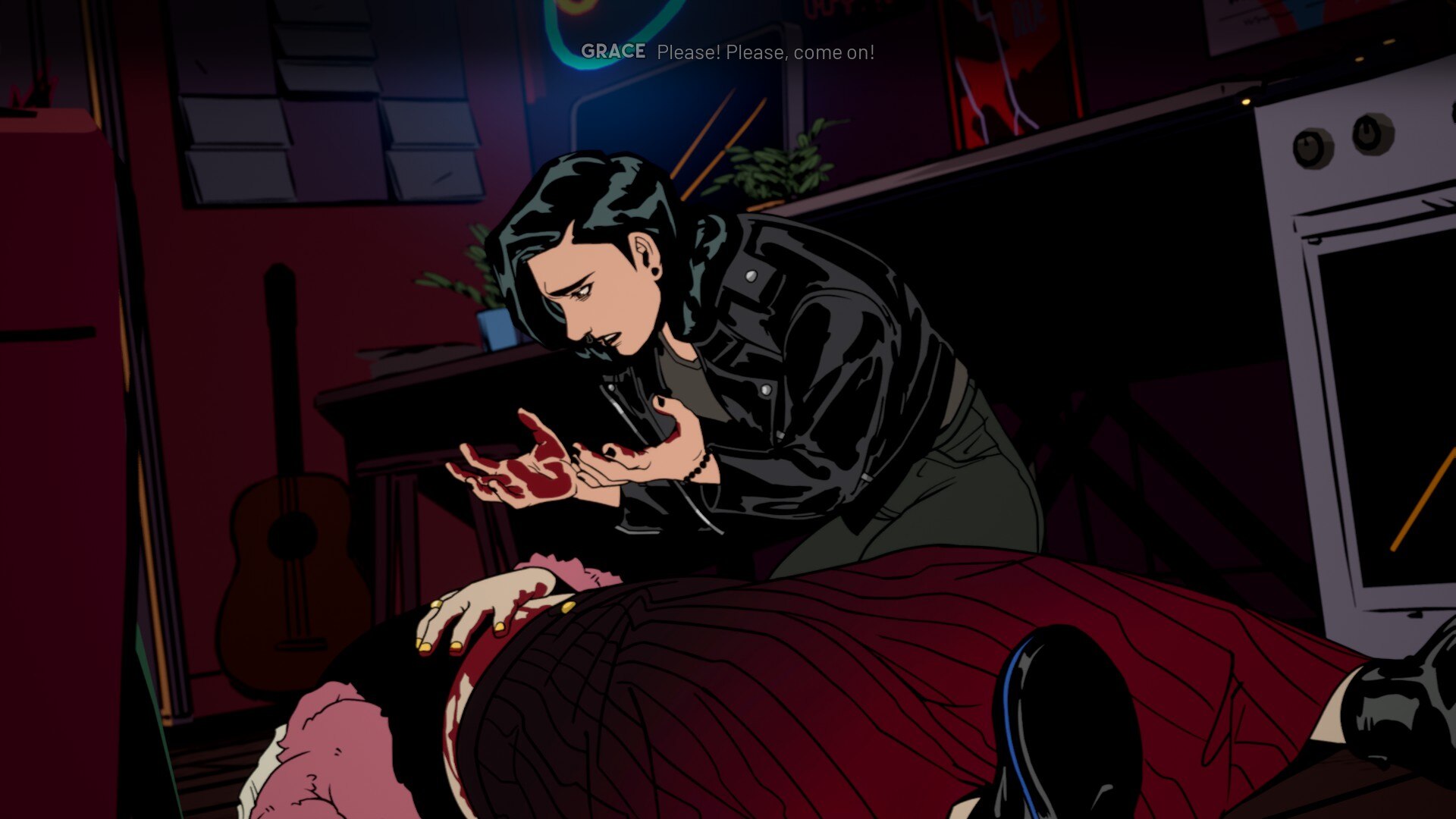
Taking centre stage is Grace, a young lady who is introduced to us in the beginning during her band auditions, as Grace and her team are looking to get a new member to change their style. Things are not going well, so the gang depart for the night, but Grace decides to stay and practice singing. This leads to a random introduction to a lady named Calliope, who comes in after hearing Grace sing and decides to go for a late audition and to Grace’s surprise, ends up being amazing. Calliope leaves, but later in the evening ends up appearing again at Grace’s apartment, wounded and eventually dying on Grace’s floor. Something strange happens, a flash of light travels out of Calliope and into Grace, making her a muse and inheriting the power of a Greek god. Blamed for the murder of Calliope by Athena, Grace has seven days to prove her innocence, as the game takes her and various other Greek gods on an investigative journey around town to find out what truly materialized with the death of Calliope.
A heavy focus is on the game’s story, as with limited gameplay, it must excel at other elements. Stray Gods: The Roleplaying Musical offers an entertaining murder mystery with some fantastical elements thanks to its inclusion of the Greek gods now hidden away within an American city, a very different location to the historical setting of Greece. It reminds me a little of how Fables did its setup with the characters of folklore coming to live in the “real world”. This helps the game create a new-looking cast of Greek gods, with the main characters getting time to shine and share their personalities and pains along with Grace, such as Athena, Apollo, Persephone and Pan being some of the bigwigs that Grace will have to interactive with over the course of the investigation. This is not just a light-natured story but goes into the struggles of living as a Greek god, well Idol, as they now call themselves. One such segment involves an idol who struggles with the memories of war and wants to keep committing suicide to forget about them for a few years before they come back into her memory. It’s a life she has been living for a few cycles, the whole death, forget, live, remember, death cycle was a scene I found rather fascinating to watch unfold and wondered what I would do if I was in the same situation.
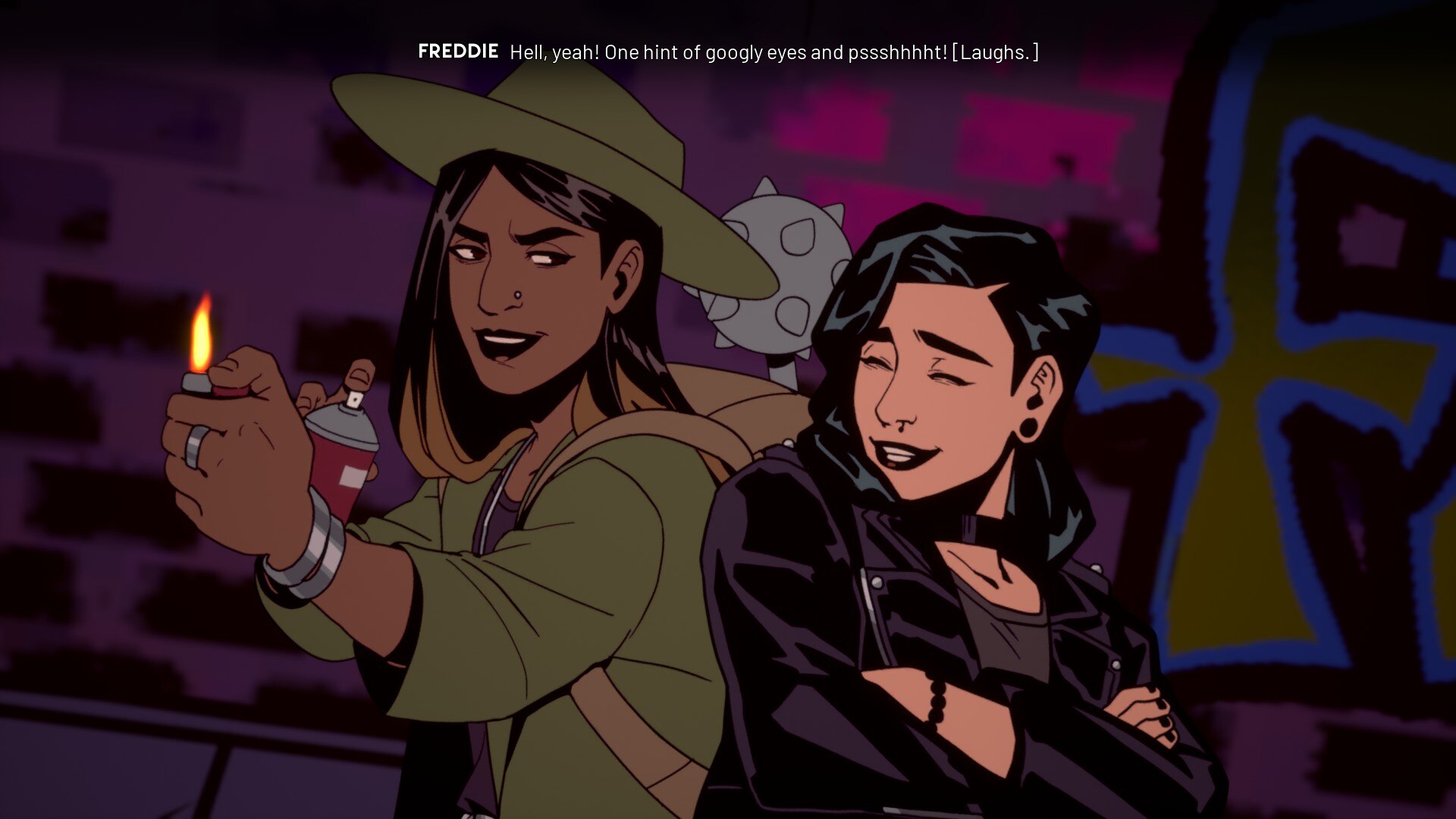
Gameplay is incredibly restricted, more so than the typical story adventure game due to how the navigation in Stray Gods: The Roleplaying Musical is composed. Players have no interaction with movement, with only the occasional option between selecting a few people to talk to in a room, checking a few items out on the item list menu to the side or taking Grace to another location on a map when multiple options open in the story. There are no investigations to do, no first-person clicking around to find clues in the environment in the vein of something like Phoenix Wright: Ace Attorney. The game is a visual novel, mostly, given some dialogue optional choices that can lead to different dialogue. This is truer when the dialogue options have emotions tied to them, as these are locked behind a nature trait that the player must assign to Grace at the start. This will open the options for Grace to be more Charming, Kickass or Clever, leading to outcomes that are made easier due to these options. Grace gains a second nature later in the game from between the remaining two options to open more dialogue choices as the story reaches its climax.
Grace’s power is to make people reveal their true feelings through song, which helps her uncover the mysteries and pains of each idol. This is where the exciting options in the dialogue appear, as these musical set pieces are where Grace must make time-based choices in the topic of the three natures available. Thankfully, these nature selections that the player picks to assign to Grace in the story that restricts standard dialogue choices do not limit these options that appear during the songs, letting players decide how to approach their verse by either being charming, clever or a tough badass. This does make the nature select come across as more of a throwaway feature, but I feel this is for the best, as limited options in songs would hurt the overall quality of the game’s biggest attraction, the ability to change how the song plays out.
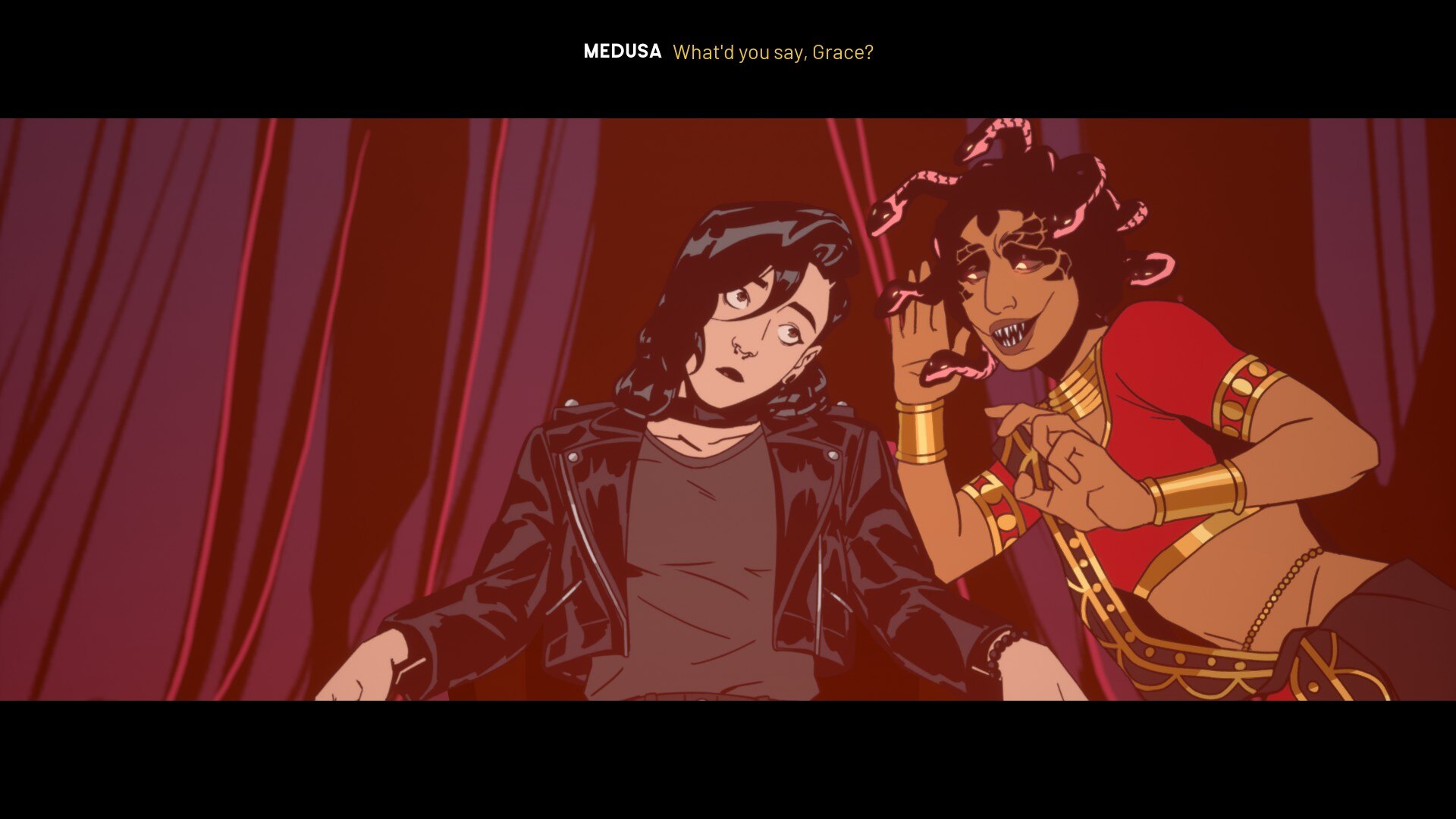
Being charming, aggressive or clever changes how Grace sings and replies with the lyrics to the other singers. This might happen a few times in a song, as it is not for every line, but to set what the next verse from Grace will be themed around, often altering the music as well to fit with the selection. It is wonderful to see how different the songs unfold (there is even a soundtrack for each nature, giving a full soundtrack dedicated to the charming, kickass or clever outcomes of the songs), and the fact that the songs are brilliantly composed and sung by the voice actors, some I did not even know could sing this well, makes for such a treat on the ears, no matter which trait is selected on the return. These selected verses in the songs change elements of the story, even as far as making a life-or-death choice for some characters. Some songs can be hit or miss, but the ones that hit hard, you do not just remember the dialogue option within Stray Gods: The Roleplaying Musical, but the entire song and the emotions tied to it. It does not cop out with catchy beats to get the player addicted to the songs, but its writers, composers and singers have put their whole heart and soul, along with the animators, into delivering impactful scenes that shine with music and voice, a truly unique experience in a video game that I hope to see more of.
The game’s presentation is superb. I have already mentioned the brilliant songs and the great voices that sing the lyrics, but this holds true for the general dialogue too, as each character is fully voiced and delivers the script well. The cast is full of big hitters, such as Laura Bailey, who plays the main character Grace, Troy Baker (Apollo), Mary Elizabeth McGlynn (Persephone), Ashley Johnson (Calliope) and Felicia Day (Athena), just to name a few. Hard to fault the cast and their performance here. The visuals are also wonderful, going for a striking comic book style with distinct colours and shading. The game stays with this comic book theme throughout, as there are no smooth animations, but quick shifts as characters move position. This means that characters do not move their lips for dialogue, which I did not mind, since the comic book aesthetics are clearly showcased, giving the game a digital graphic novel appearance that can still get the intended mood across for the scene on display.
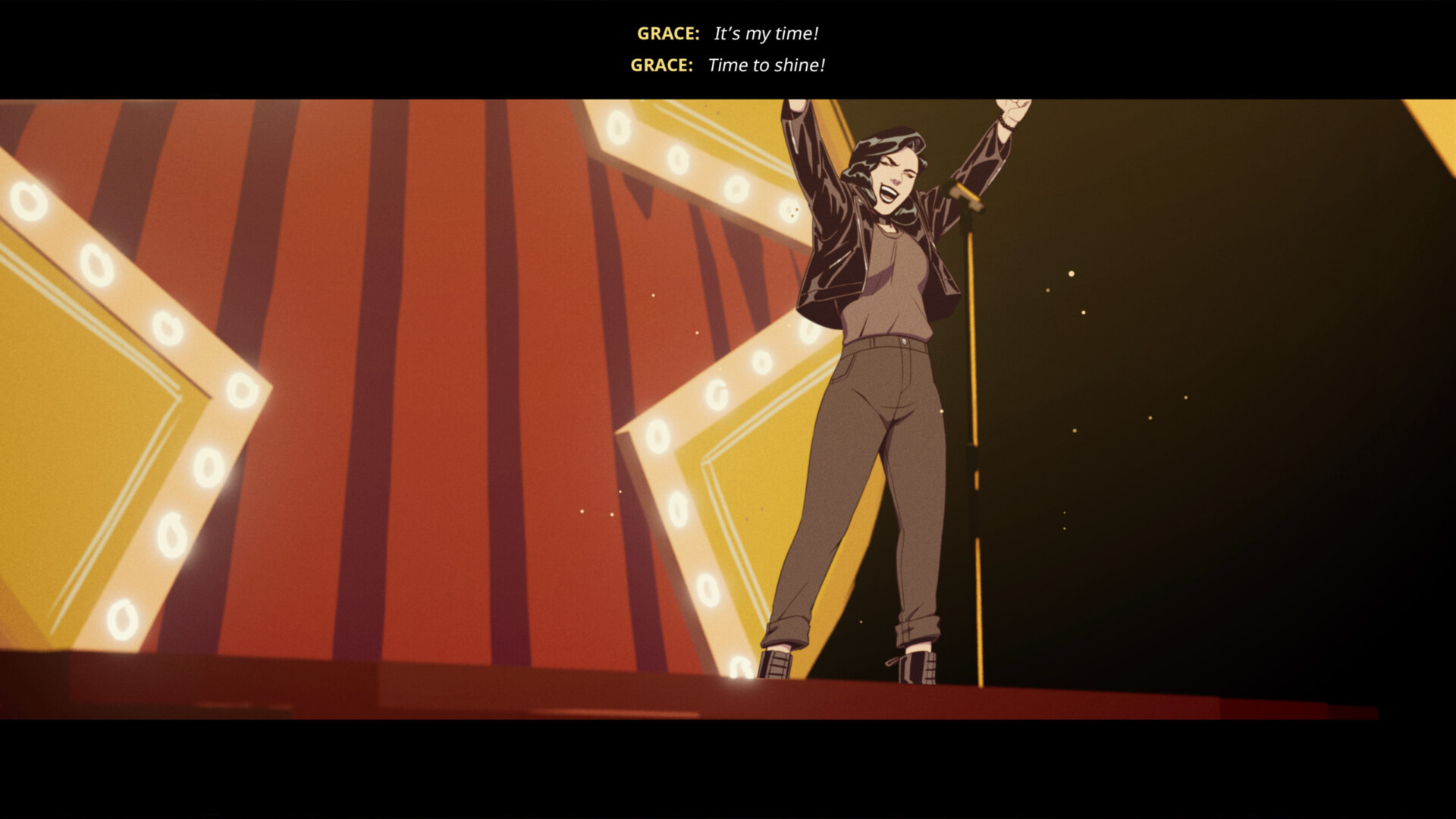
Stray Gods: A Roleplaying Musical offers an enjoyable murder mystery visual novel musical. This is down to the themes and the twist on Greek mythology. The addition of being a musical and the options for the player to change the outcomes of the songs through personality options helps make Stray Gods: A Roleplaying Musical bring a unique experience to video games. It leans more towards being an interactive story than a video game, and maybe any follow-ups can balance this to make it more of a video game. Still, that is not to put a damper on Stray Gods: A Roleplaying Musical, because what is here is a compelling piece of entertainment that I was fully engaged with the 5+ hours it lasted. A new sub-genre has been created with Stray Gods: A Roleplaying Musical, and with anything new, this can mean future iterations can only get better and that excites me seeing how the blend of music and story-driven adventure games could become, because Stray Gods: A Roleplaying Musical is a one-off experience I would like to become involved with again.
